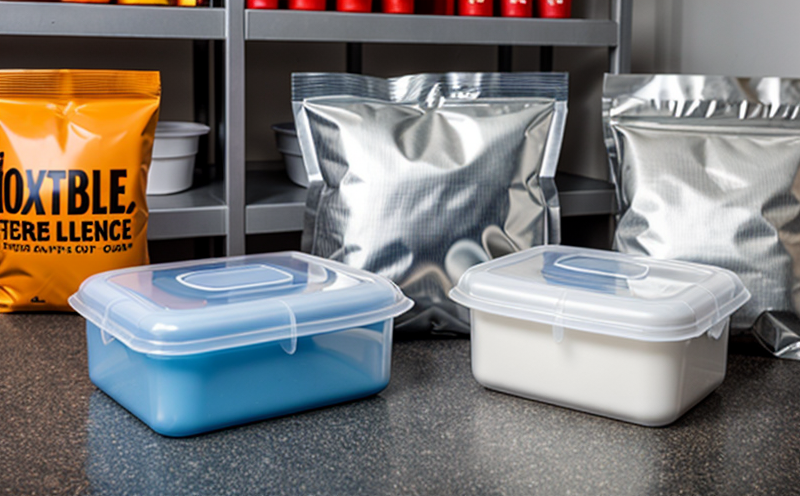ASTM F88M-15 Seal Strength for Flexible Packaging
The ASTM F88M-15 standard defines a test method to determine the seal strength of sealed flexible packaging materials, such as those used in food and pharmaceutical industries. This standardized procedure is critical for ensuring product integrity during storage and transportation. Seal strength refers to the force required to break or separate two layers that are joined by adhesive or mechanical means.
Flexibility and sealability are key properties when selecting packaging materials, especially in industries where lightweight products demand robust seals. The ASTM F88M-15 test ensures that the seals do not fail under normal conditions, thereby protecting the product from contamination or damage. This service is particularly important for flexible packaging used in sectors like food processing and pharmaceuticals.
The test is performed by clamping a sample of the sealed package between two grips at a specific angle to simulate real-world conditions. The seal strength is then measured as the force required to separate the layers. Compliance with this standard ensures that the seals are reliable, which is crucial for maintaining product quality and safety.
For accurate testing, it's essential to follow the precise methodology outlined in ASTM F88M-15. This includes specific requirements for sample preparation, such as ensuring the sample is free of defects or contaminants before the test. The apparatus used must meet stringent precision specifications detailed in the standard. For instance, the grips should have a consistent surface finish and be capable of applying uniform force.
The acceptance criteria are critical to interpreting the results correctly. A seal fails if it breaks at any point other than where the seal is formed during the test procedure. Understanding these criteria helps ensure that only reliable seals pass inspection, maintaining product integrity throughout distribution chains.
Compliance with ASTM F88M-15 not only ensures product quality but also enhances brand reputation by demonstrating adherence to international standards. This is particularly important in competitive markets where customers expect high-quality packaging solutions. By ensuring seal strength meets or exceeds the specified requirements, businesses can reduce risks associated with compromised seals and potential legal issues.
In summary, ASTM F88M-15 is a vital tool for quality assurance teams responsible for maintaining product integrity during packaging processes. It provides a standardized method for assessing seal strength, which is essential for ensuring compliance with international standards and enhancing the overall quality of flexible packaging materials.
Scope and Methodology
The ASTM F88M-15 test focuses on evaluating the seal strength between two layers of flexible packaging material. This test is particularly relevant for packages that use heat sealing, ultrasonic welding, or other methods to join materials securely. The standard outlines precise procedures to ensure consistency in testing practices across different laboratories.
The methodology involves preparing a sample by cutting it into strips with a specific width and length. These samples are then subjected to the seal strength test using specialized equipment. The grips used for clamping the sample should be calibrated according to ASTM F88M-15 specifications, ensuring accurate measurement of the force required to separate the layers.
The test is conducted at room temperature under controlled conditions to minimize variability in results. The sample is positioned between the grips with a specific angle to simulate real-world packaging configurations. Once the sample is clamped securely, it undergoes tensile loading until separation occurs. The force required for this separation is recorded and used as an indicator of seal strength.
The acceptance criteria are strictly defined in ASTM F88M-15. A sealed sample passes if it breaks at a point other than where the seal was formed during the test. This ensures that only reliable seals pass inspection, maintaining product integrity throughout distribution channels. Compliance with this standard is crucial for ensuring consistent and reliable results across different laboratories.
By following the precise procedures outlined in ASTM F88M-15, packaging manufacturers can ensure that their products meet rigorous quality standards. This not only enhances brand reputation but also reduces the risk of compromised seals leading to product contamination or damage during transit.
Environmental and Sustainability Contributions
- Eco-friendly Materials: The ASTM F88M-15 test ensures that flexible packaging materials are robust enough to withstand environmental conditions, reducing the need for over-packaging. This minimizes waste and supports sustainable practices.
- Energy Efficiency: By ensuring product integrity during storage and transportation, this standard helps reduce energy consumption associated with frequent replacement of damaged packages. Lowering the number of returns due to compromised seals contributes to more efficient supply chains.
The ASTM F88M-15 seal strength test plays a crucial role in promoting sustainability by ensuring that flexible packaging materials are reliable and durable. This reduces waste, supports eco-friendly practices, and contributes positively to environmental conservation efforts.
Competitive Advantage and Market Impact
- Better Product Integrity: By ensuring robust seals through ASTM F88M-15 testing, companies can enhance their product integrity, which is critical in competitive markets.
- Informed Decision-Making: Compliance with international standards like ASTM F88M-15 allows businesses to make informed decisions about packaging materials and processes. This leads to improved quality control and reduced risks associated with compromised seals.
The ability to demonstrate compliance with such a stringent standard can be a significant differentiator in the market, as it signals commitment to high-quality products and processes. Customers are increasingly seeking suppliers who prioritize sustainability and product integrity, making ASTM F88M-15 compliance an essential factor for gaining competitive advantage.





